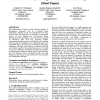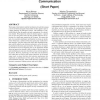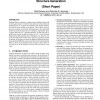ATAL
2008
Springer
14 years 2 months ago
2008
Springer
The implementation of software systems with large numbers of heterogeneous components calls for a powerful design methodology. Although several such methodologies have been propos...
ATAL
2008
Springer
14 years 2 months ago
2008
Springer
In most of the existing approaches to the design of multiagent systems, there is no clear way in which to relate organisational and normative structures to the model of the enviro...
ATAL
2008
Springer
14 years 2 months ago
2008
Springer
In this paper, we describe the development of an Embodied Conversational Agent (ECA) implementing the concept of a companion, i.e. an agent supporting the persistent representatio...
ATAL
2008
Springer
14 years 2 months ago
2008
Springer
The design of deterministic and fair mechanisms for selection among a set of self-motivated agents based solely on these agents' input is a major challenge in multiagent syst...
ATAL
2008
Springer
14 years 2 months ago
2008
Springer
As increasing numbers of processors and agents pervade the human environment, societies comprising both humans and agents will emerge. Presently, it is unknown how a person might ...
ATAL
2008
Springer
14 years 2 months ago
2008
Springer
There is an increasing number of agent-oriented programming languages that have working interpreters and platforms, with significant progress in the quality of such platforms over...
ATAL
2008
Springer
14 years 2 months ago
2008
Springer
Forming effective coalitions is a major research challenge in the field of multi-agent systems. Central to this endeavour is the problem of partitioning the set of agents into exh...
ATAL
2008
Springer
14 years 2 months ago
2008
Springer
In this paper we study tools for conviviality to develop user-friendly multiagent systems. First, we show how to use the social-cognitive concept of conviviality in multiagent sys...
ATAL
2008
Springer
14 years 2 months ago
2008
Springer
This paper presents an experiment that evaluates and compares the user enjoyment when playing a game of chess in two situations: against a physically embodied robotic agent and ag...
ATAL
2008
Springer
14 years 2 months ago
2008
Springer



